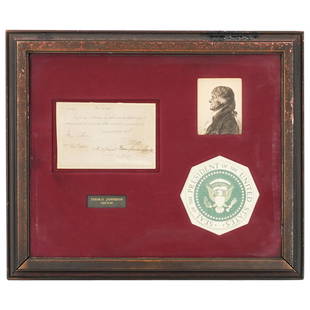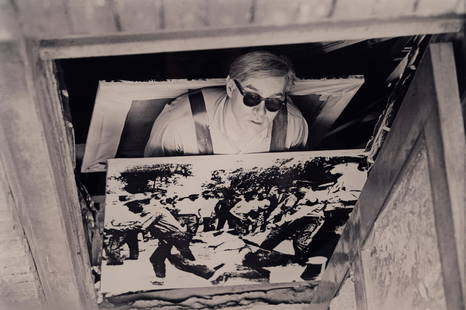
1808 Th; Jefferson Broadside Act Signed in Print Titled: Laying an Embargo on all Ships and Vessels
Similar Sale History
View More Items in Political MemorabiliaRelated Political Memorabilia
More Items in Political Memorabilia
View MoreRecommended Historical Memorabilia
View More






Item Details
Description
Autographs
January 9, 1808 Historic Broadside Act Signed in Print "Th; Jefferson" Titled: "An act laying an embargo on all ships and vessels in the ports and harbors of the United States."
(THOMAS JEFFERSON) (1743-1826). Third President of the United States (1801-1809), Principle Author of the Declaration of Independence. (Signature in Printed Text.)
January 9, 1808-Dated, Printed Broadside Act of Congress, Signed (TH ; JEFFERSON.) with his Signature in Printed Text at conclusion (not hand-signed), 1 page, sheet size measuring 8" x 14", at Washington, Very Fine. This being An Act Supplementary to the Act fully titled:
"An act laying an embargo on all ships and vessels in the ports and harbors of the United States."
This Broadside is boldly printed in deep black on laid period paper, its full huge original margins on all four sides, previously folded for mailing, two small pencil eraser side burn holes are located in the lower left column, each affecting a few words of text as shown. There is some nearly invisible archival reinforcement of several folds on its clean blank reverse side and a small bottom right margin edge chip. This 1808 Broadside also bears the names of Joseph B. Varnum, Speaker of the U.S. House of Representatives; George Clinton, Vice President of the United States and President of the U.S. Senate; and Thomas Jefferson as President.
An important historic American Broadside of national and international consequence. It announces the first of several supplementary "Acts to the Embargo." Passed by Congress on January 8, 1808, this Act addressed a "loophole" in the 1807 Embargo Act that had exempted coastal fishing and whaling vessels, that subsequently turned out to be circumventing the original Act by trading with Great Britain, primarily through Canada. The supplementary Act was primarily concerned with the further bonding of Coastal as well as River vessels. Those violating the law would be liable to suffer severe penalties, including potential forfeiture of their ship and its cargo, or be subject to a fine double the value of both.
This Act also removed the "Warship" Exemption from Privateers and/or vessels with a Letter of Marque. It set large fines and procedures for the Seizure for Foreign Ships loading cargo for export. In March 1808, a second supplementary Act was passed by Congress and signed into law by President Jefferson which Prohibited All Exports, by either sea or land. Despite the embargo and its supplementary Acts, many American shippers ignored the unpopular measure, and protests against the Act steadily increased. Thomas Jefferson in March 1809, shortly before leaving the presidency, signed legislation Repealing the Embargo.
During the Napoleonic Wars, which lasted from 1803 to 1815, Britain and France imposed trade restrictions in order to weaken each other's economies. The United States declared neutrality and did not support either country. Despite its neutral stance, United States trade was disrupted by the restrictions imposed by Britain and France.
As time went on, harassment by the British of American ships increased. This included impressment and seizures of American men and goods. The volatile situation came to a head with the Chesapeake-Leopard Affair, in which the British ship HMS Leopard pursued and captured the USS Chesapeake off the coast of Norfolk, Virginia, in June 1807, seeking deserters from the Royal Navy.
Four crew members were removed from the ship and tried for desertion, with one being executed. Americans were outraged by the incident, generating calls for war with Great Britain. President Thomas Jefferson chose economic over military warfare, and the result was the Embargo Act of 1807. Passed by Congress on December 22, 1807, the act closed all U.S. ports to export shipping in either U.S. or foreign vessels, and restrictions were placed on imports from Great Britain.
January 9, 1808 Historic Broadside Act Signed in Print "Th; Jefferson" Titled: "An act laying an embargo on all ships and vessels in the ports and harbors of the United States."
(THOMAS JEFFERSON) (1743-1826). Third President of the United States (1801-1809), Principle Author of the Declaration of Independence. (Signature in Printed Text.)
January 9, 1808-Dated, Printed Broadside Act of Congress, Signed (TH ; JEFFERSON.) with his Signature in Printed Text at conclusion (not hand-signed), 1 page, sheet size measuring 8" x 14", at Washington, Very Fine. This being An Act Supplementary to the Act fully titled:
"An act laying an embargo on all ships and vessels in the ports and harbors of the United States."
This Broadside is boldly printed in deep black on laid period paper, its full huge original margins on all four sides, previously folded for mailing, two small pencil eraser side burn holes are located in the lower left column, each affecting a few words of text as shown. There is some nearly invisible archival reinforcement of several folds on its clean blank reverse side and a small bottom right margin edge chip. This 1808 Broadside also bears the names of Joseph B. Varnum, Speaker of the U.S. House of Representatives; George Clinton, Vice President of the United States and President of the U.S. Senate; and Thomas Jefferson as President.
An important historic American Broadside of national and international consequence. It announces the first of several supplementary "Acts to the Embargo." Passed by Congress on January 8, 1808, this Act addressed a "loophole" in the 1807 Embargo Act that had exempted coastal fishing and whaling vessels, that subsequently turned out to be circumventing the original Act by trading with Great Britain, primarily through Canada. The supplementary Act was primarily concerned with the further bonding of Coastal as well as River vessels. Those violating the law would be liable to suffer severe penalties, including potential forfeiture of their ship and its cargo, or be subject to a fine double the value of both.
This Act also removed the "Warship" Exemption from Privateers and/or vessels with a Letter of Marque. It set large fines and procedures for the Seizure for Foreign Ships loading cargo for export. In March 1808, a second supplementary Act was passed by Congress and signed into law by President Jefferson which Prohibited All Exports, by either sea or land. Despite the embargo and its supplementary Acts, many American shippers ignored the unpopular measure, and protests against the Act steadily increased. Thomas Jefferson in March 1809, shortly before leaving the presidency, signed legislation Repealing the Embargo.
During the Napoleonic Wars, which lasted from 1803 to 1815, Britain and France imposed trade restrictions in order to weaken each other's economies. The United States declared neutrality and did not support either country. Despite its neutral stance, United States trade was disrupted by the restrictions imposed by Britain and France.
As time went on, harassment by the British of American ships increased. This included impressment and seizures of American men and goods. The volatile situation came to a head with the Chesapeake-Leopard Affair, in which the British ship HMS Leopard pursued and captured the USS Chesapeake off the coast of Norfolk, Virginia, in June 1807, seeking deserters from the Royal Navy.
Four crew members were removed from the ship and tried for desertion, with one being executed. Americans were outraged by the incident, generating calls for war with Great Britain. President Thomas Jefferson chose economic over military warfare, and the result was the Embargo Act of 1807. Passed by Congress on December 22, 1807, the act closed all U.S. ports to export shipping in either U.S. or foreign vessels, and restrictions were placed on imports from Great Britain.
Buyer's Premium
- 30%
1808 Th; Jefferson Broadside Act Signed in Print Titled: Laying an Embargo on all Ships and Vessels
Estimate $1,500 - $2,000
1 bidder is watching this item.
Shipping & Pickup Options
Item located in Winchester, VA, usSee Policy for Shipping
Payment
Accepts seamless payments through LiveAuctioneers

Related Searches
TOP






























![[Presidential] Jefferson, Thomas, and James Madison...: [Presidential] Jefferson, Thomas, and James Madison, Land Grant. Washington: May 20, 1806. Folio on vellum. Document signed by Thomas Jefferson (“Th. Jefferson”) as President of the United States,](https://p1.liveauctioneers.com/65/168030/85177919_1_x.jpg?height=310&quality=70&version=1588715715)































![Pres. Bush Wants “repeal of the hateful [UN] ‘Zionism is Racism’ resolution”: BUSH, GEORGE H.W. (1924-2018). Forty-first president of the United States and father of George W. Bush, the forty-third U.S. president. TLS. (“George Bush”). 1p. Small 4to. Washington, D.C](https://p1.liveauctioneers.com/9124/328425/177345183_1_x.jpg?height=310&quality=70&version=1715202740)










![Document Signed by Two Judges Later Connected to Salem Witch Trials: [SALEM WITCH TRIALS]. HATHORNE, JOHN. (1641-1717). Massachusetts Bay Colony magistrate remembered for his role in the Salem Witch Trials and great-great-grandfather of Nathaniel Hawthorne. ADS. (̶](https://p1.liveauctioneers.com/9124/328425/177345351_1_x.jpg?height=310&quality=70&version=1715202740)